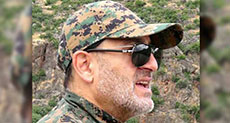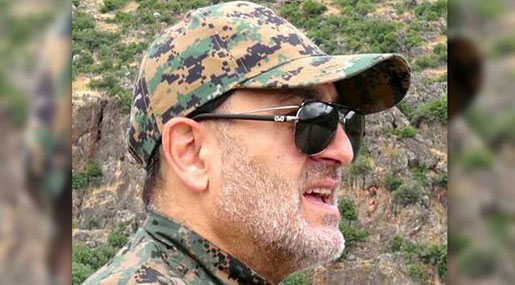
About the Rascal, the Elegant and the Smiling...the Determined and Courageous Commander

Ibrahim Al-Amin
Zulfikar [Mustafa Badr al-Din] was not an ordinary man. Stories told by family and loved ones after his martyrdom, reveal his uniqueness. No need to exaggerate or show excessive admiration to rank him as a hero. There is nothing like martyrdom to raise someone's status among people.

The elegant, handsome, smart "Al-Sayyed" was not an ordinary man. Not because of his high rank among the leadership, but because he was not an ordinary person, even among his colleagues and comrades.
Courage and impulse always pushed him stop at the red lines. He was a man who knew how to be in the most difficult situations, never backing down from a challenge while his courage got him closer to his enemy.
Many did not know how to play his game: the pursuit of high levels of professionalism in everything that he did. Unusual job requirements pulled him away from ordinary life but that did not prevent him from living. Nothing prevented him from loving life. Nothing prevented him from thinking about things some might deem strange in the world of resistance and resistance fighters. Nothing prevented him from continuing his university education when it was made available to him, or mixing with a variety of people, from those of his own social environment and party to others. He roamed the world, moving from one place to another to live or work. He refused to be ignorant about things that his colleagues often dismissed and viewed as low rank.
Seduction was one of his best weapons. Not many people could resist it. Those who fell under his spell gained a lot, including those who may have at times been angry with him as well as those who lived, worked, and fought alongside him. But he was firm with those who broke his rules, whether in personal relationships or at work.
His firmness and seriousness, diligence and cruelty - call it what you wish - allowed him to command fear that was planted in the hearts of his enemies, and visible on the faces of those close to him. But when he felt that he wronged someone or caused him harm, he blamed himself, apologizing and asking for forgiveness. On one occasion he begged one of the resistance fighters to allow him to kiss his hands and feet, asking for forgiveness and apologizing.
In the mid-nineties, "Al-Sayyed" oversaw military operations within the resistance. He was behind the planning, preparation, implementation and follow-up, but he also maintained the image of the resistance and the resistance fighters. He was enthusiastic about having special interaction with the media. And it was clear what motivated him: Why enter my room from the window, while I can welcome you through the door?
This was the first message I received from a man who was not afraid to leave his mark with his work. The offer for me was that I stop playing the journalist who wanted to know private details and exploit personal relationships in order to reach them. He sent me a message: "Come and drink from the top of the spring!"
Then, it became possible to know about the operations shortly after they occurred. He had his rules. If they were respected and information that was not for publication remained unused, that meant more information. And, of course, more scoops are always attractive to a journalist. And that was what Zulfikar knew well. When the famous Ansariyeh operation took place, "Al-Sayyed" was annoyed with the manner in which some people talked about this achievement, indicating that he [Badr al-din] was not linked to it. He was also irritated with the lack of imagination on the part of the Lebanese as well as the "Israelis", who were puzzled for years about how the resistance uncovered the operation in question. For his part Hizbullah's Secretary General, Sayyed Hassan Nasrallah, later revealed the operation, linking it to the need not to exclude the "Israeli" enemy as one of the suspects behind the assassination of Rafik Hariri.
On that day, Zulfikar was keen to highlight the operation but was concerned with overpublicizing details, hoping to avoid making security mistakes and jeopardizing future operations. Some of his friends even said that he took it too far. But early on, he was one of the few to realize the importance of images and the media in this battle. It was the same interest that characterized the relationship between his colleague martyr Imad Mughniyeh and the media, activities, and others.
Years passed and Zulfikar left his direct military tasks, allowing martyr Radwan [Imad Mughniyeh] to assume full responsibility. During a period that stretched on for years, the great martyr [Zulfikar] took over carefully selected tasks, which kept him close to circles associated with the decision-making center. This phase also enabled him to explore the conditions of the world, better identify opponents and enemies, and keep up to speed with the challenges of the time. Immediately after the martyrdom of Hajj Radwan, "Al-Sayyed" once again took over the major responsibilities. He became one of the few to assist the Secretary General of Hizbullah in managing the Jihadi council and its units, which had grown tenfold since Zulfikar left it years earlier.
Since that day, "Al-Sayyed" returned to executive duties, reestablishing his connection with the media. And perhaps the international tribunal accusing him of being involved in the assassination of Hariri was an additional reason for more interaction with everything that surrounded the case. But he knew exactly how to distinguish between what is going on in the court, and the commissions of inquiry which came before it. He also had the ability to overcome the proceedings in order to be more devoted to fighting the "Israeli" enemy.
One of his first tasks was to oversee the investigation into the assassination of martyr Imad. He looked into every minute detail, as he personally probed many issues related to the case and formed the indictment file against "Israel", accusing it of being behind the assassination. It was a file containing lots of accurate and comprehensive information, including the planning of the operation, the manner in which security was breached in order to obtain data on Hajj Imad before the crime was carried out, who was behind it and how the Zionists entered and exited Syria, as well as who cooperated with them and provided them intelligence or logistical support. Along with the investigation, Zulfikar oversaw the biggest development in anti-spyware within the resistance, which allowed not only the dismantling of enemy agent networks, but also disabling many "Israeli" and American programs.
Throughout that period, even after he assumed responsibility of the Syria file, Zulfikar was not absent from overseeing other sensitive files. He was always cautious, foreseeing that the enemy was no longer (only) "Israel" and the people it is recruiting. He was aware of the role played by Western, Arab, and even Lebanese intelligence services in hunting down resistance fighters. He was able to do a lot of things to confuse those agents, who actively worked for their American, Saudi, and "Israeli" masters to reach him, kill him...or even kidnap him!
Zulfikar, the decisive military commander, was a friendly child at heart, just like his children who grew up like other children of the resistance leaders. At dawn yesterday, his son Ali, was moving from room to room crying, eagerly awaiting his father's return and asking his friends about the time of the body's arrival, yearning to be in his father's arms even though he is a martyr. Born to a man like Mustafa Badr Al-Din, his daughters endured the hardships of life. They sat beside Hajja Saada - Hajj Imad's widow, martyr Jihad's mum and martyr Mustapha's sister - a woman who reminds us today of the story of Zainab Al-Kubra, the guardian of the martyrs' legacy. His elder brother, Adnan, who was addressing his martyr brother: "How did you let them get you Mustafa?" rushed into the family house to consume the scent and words left behind by the martyr.
Several months ago, at a gathering in the family house in Ghobeiry, Zulfikar apologized to the neighbors for not checking up on them. He would humor them by saying: "Forgive me, I can't walk around a lot, Ghobeiry police have issued an arrest warrant for me because I was driving a motorcycle without a helmet." He used to laugh as he made fun of his foes who used all means to smear his reputation among his family and friends. It's a campaign resistance leaders are exposed to all the time. That day, Sayyed Hassan came out to defend the leaders in the face of the enemies. Zulfikar then said that they believe these campaigns will push us back to our homes. He said decisively: "my duty is to confront all these projects, and I will not leave my work in Lebanon, Syria or any other arena, but as a martyr or a holder of the banner of victory."
The man has a very long biography of Jihad, the full details of which may someday be released, but as is the case with his companion Hajj Radwan, his achievements will remain unknown for years - longer or shorter time frame- depending on what the resistance sees fit. It is not about praising the history of the martyr leaders, but rather the foundations which they have laid that will be used for a long time to come. These programs will be followed up by their successors in leading the open battle against the "Israelis", Takfiris, the United States, Saudi Arabia, Turkey, and their allies.
There are two types of enemies of the great martyr. The one who knows about him will remain fearful of him even after his death, and will continue to brace for a retaliation prepared by Zulfikar himself. The second is ignorant of him, but the day will come when he will meet a hero from my nation!
Source: Al-Akhbar
Comments



